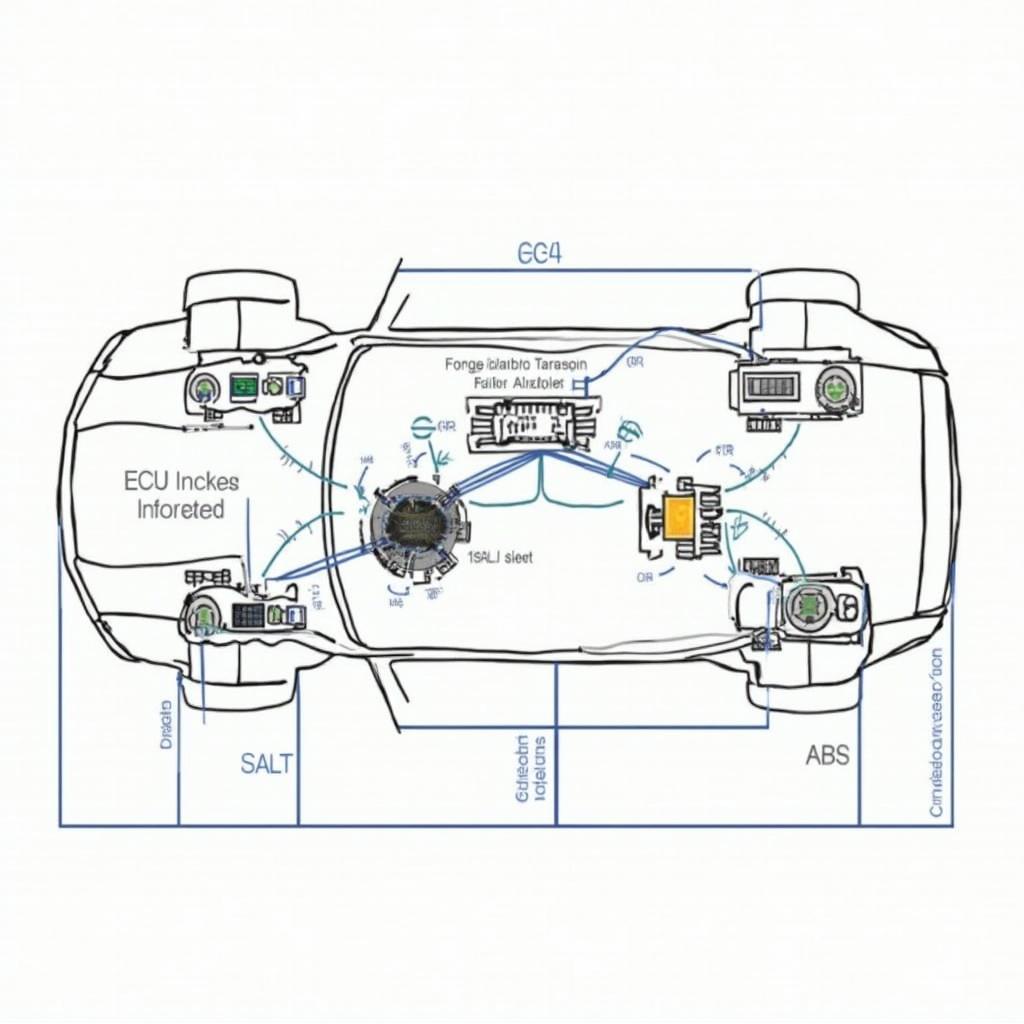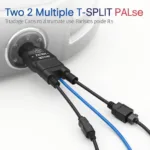The OBD2 code B0000 is a generic code that indicates a problem with the vehicle’s communication network. While it doesn’t point to a specific component, it suggests an issue with how different modules within your car communicate. Ignoring this code can lead to various problems, including reduced performance, safety concerns, and difficulty diagnosing future issues.
What does the OBD2 Code B0000 Mean?
In essence, the B0000 code signals a fault within the Controller Area Network (CAN) system, your car’s internal communication network. This network allows various electronic control units (ECUs) to share data and function in sync. When the B0000 code appears, it means one or more ECUs are experiencing communication problems, preventing data exchange.
 Illustration of a Car's CAN Network
Illustration of a Car's CAN Network
Common Causes of OBD2 Code B0000
The B0000 code can be triggered by a variety of factors. Here are some of the most common culprits:
- Wiring Problems: Damaged, corroded, or loose wiring within the CAN bus system can disrupt communication between ECUs.
- Faulty ECU: A malfunctioning ECU can fail to send or receive data correctly, triggering the B0000 code.
- Weak Battery or Charging System: The CAN bus system relies on a stable voltage supply. A weak battery or a faulty alternator can lead to communication errors.
- Aftermarket Installations: Improperly installed aftermarket accessories that interface with the car’s electrical system can interfere with CAN bus communication.
Symptoms of OBD2 Code B0000
The symptoms of a B0000 code can vary greatly depending on the specific communication fault. Some common symptoms include:
- Check Engine Light Illumination: The most apparent symptom is the illumination of the check engine light on your dashboard.
- Erratic Transmission Behavior: You might experience rough shifting, gear slippage, or unexpected shifting patterns due to communication problems between the transmission control module and other ECUs.
- Engine Performance Issues: The B0000 code can lead to a decrease in fuel efficiency, engine misfires, or a lack of power.
- Malfunctioning Gauges and Dashboard Lights: Communication errors can result in inaccurate readings on gauges or the malfunctioning of warning lights.
Diagnosing and Fixing OBD2 Code B0000
Due to the complexity of the CAN bus system, diagnosing the root cause of the B0000 code often requires specialized tools and expertise. Here’s a general approach:
- Read and Interpret the Code: Use an OBD2 scanner to retrieve the specific B0000 code and any other stored codes.
- Visual Inspection: Thoroughly inspect all the wiring and connectors related to the CAN bus system for any signs of damage, corrosion, or loose connections.
- Battery and Charging System Check: Ensure the battery is adequately charged and the alternator is functioning correctly.
- ECU Testing: If wiring and power supply seem fine, specialized diagnostic equipment might be required to test the individual ECUs for faults.
“Diagnosing communication errors often necessitates a systematic approach, starting with a visual inspection of the wiring harness and concluding with module-specific testing,” says John Miller, a seasoned automotive electrician with over 20 years of experience. “While some fixes are straightforward, others might require specialized knowledge and equipment.”
Can I Still Drive with OBD2 Code B0000?
While driving short distances with the B0000 code might be possible, it’s not recommended. The underlying communication issues can lead to unpredictable vehicle behavior, potentially compromising your safety and causing further damage.
Preventing OBD2 Code B0000
Preventing the B0000 code involves maintaining your car’s electrical system in top condition. Regularly check your battery and charging system, ensure all wiring connections are secure and corrosion-free, and be cautious with aftermarket installations.
Conclusion
The OBD2 code B0000, while seemingly generic, signals a potentially serious issue with your car’s communication network. Understanding its implications and taking prompt action can prevent more significant problems and ensure your vehicle operates reliably and safely.
Frequently Asked Questions (FAQs)
1. Can a loose battery terminal cause the B0000 code?
Yes, a loose battery terminal can disrupt the voltage supply to the ECUs, potentially triggering the B0000 code and other communication errors.
2. Is it safe to clear the B0000 code without fixing the problem?
While clearing the code might temporarily turn off the check engine light, the underlying problem persists and will likely cause the code to reappear.
3. Can I fix the B0000 code myself?
If the issue is simple, like a loose wire, you might be able to fix it yourself. However, diagnosing and repairing complex ECU or wiring faults often requires professional expertise.
4. How much does it cost to diagnose and fix the B0000 code?
The cost can vary significantly depending on the root cause and labor rates. A simple wiring repair might be relatively inexpensive, while replacing a faulty ECU can be costly.
5. What other codes might appear alongside the B0000 code?
The B0000 code can appear with other codes related to specific ECUs experiencing communication problems, such as engine control, transmission control, or ABS modules.
Need further assistance with OBD2 codes?
Check out our other informative articles on OBD2 codes and their meanings:
- [Link to article about common OBD2 codes]
- [Link to article about how to use an OBD2 scanner]
For personalized assistance and expert advice, contact our dedicated support team via WhatsApp at +1(641)206-8880 or email us at [email protected]. We’re available 24/7 to answer your questions and help you resolve any car diagnostic issues.
